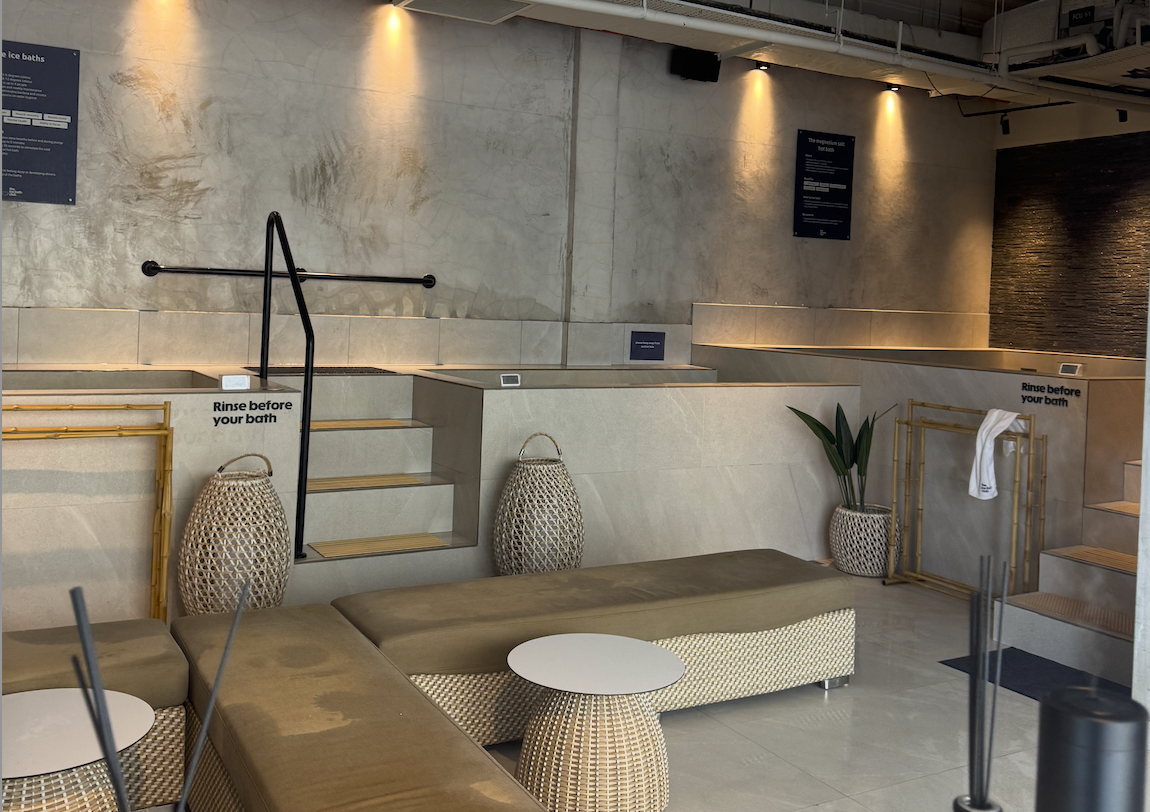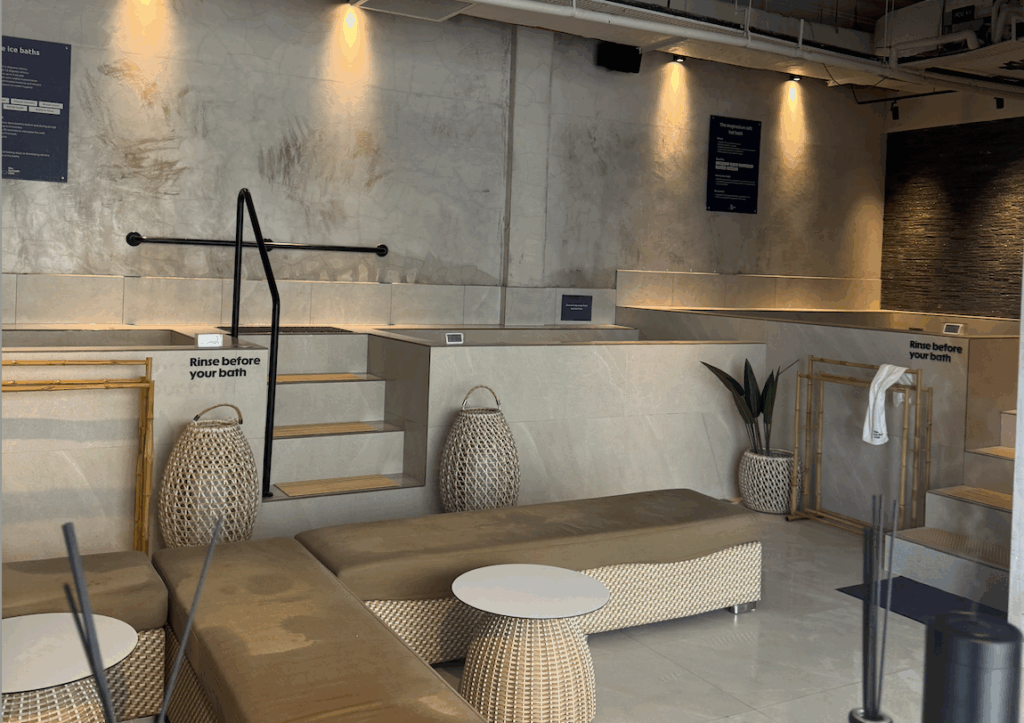
If you spent more than 10 seconds on gymtok, you’ve probably seen someone claim that ice baths boost testosterone, “balance hormones,” or help you live longer. But what about ice baths and fertility? Is it safe (or even helpful) to use them while TTC? Here’s a clear, evidence‑based look.
What cold exposure generally does
A quick dip in icy water definitely jolts the body. Stress hormones like adrenaline and cortisol shoot up, heart rate and blood pressure spike, and once you warm back up the nervous system often swings towards “rest and digest” mode. That explains why some people feel calmer afterwards. Reviews and meta‑analyses show cold water immersion can lift mood, reduce perceived stress, and help short‑term recovery from tough exercise.
Cold also switches on brown fat (BAT), which burns energy to make heat, and in both humans and animal studies this has been linked to higher calorie burn and in some cases slightly better insulin sensitivity. A few small studies suggest cold may temporarily reduce inflammation, but the data is mixed.
Translation: the post‑dip buzz is real, but we still need more studies to prove long‑term health benefits. But what about ice baths and fertility?

Effect on testosterone and sperm health
When it comes to testosterone, the research is mixed. Some early studies found that frequent cold exposure (like daily winter swimming) could lead to lower testosterone levels over time. Two studies in athletes found lower testosterone and estradiol after several whole‑body cryotherapy sessions, with no change in LH levels (two separate studies). On the flip side, other studies suggest that brief, acute cold exposure can cause a short-lived rise in in free or total testosterone whe used around training or competition.
More recent work hasn’t found strong evidence for either a consistent boost or drop. So while an occasional ice bath probably won’t tank your hormones, there’s no good evidence that it will reliably raise testosterone either.
When it comes to sperm health, there is good evidence that temperature is important. The testes are designed to run a few degrees cooler than core body temperature (hence where they sit!). Large observational data links looser underwear (boxers vs briefs) with higher sperm counts and lower FSH (a good sign the body isn’t straining to make sperm). That’s local cooling. Whole‑body ice baths are a different exposure, and there’s no evidence they improve semen quality.
Ice Baths and Fertility
Unfortunately and unsurprisingly, there’s very little human research here. A review of winter swimmers found no consistent changes in reproductive hormones like FSH or LH, though one small study did find prolactin levels went up after a season of cold swimming. Animal studies show when female rodents were kept in cold environments over long periods, their cycles became irregular, hormone production shifted, and inflammation in the ovaries and uterus increased. While this might make us more cautious, it tells us nothing about the effects of short term exposure like in an ice bath or cold plunge.
Possible benefits in PCOS
Here’s the one area where cold might help, in theory. In rodent models of PCOS, controlled cold exposure switched on brown fat, improved insulin sensitivity, lowered high testosterone, reduced ovarian cysts, and restored ovulation. Some even showed higher pregnancy rates. It’s fascinating science, but it’s still only in rats. We have no human studies showing ice baths help women with PCOS, hopefully we can get more research in this area soon.
Pregnancy: what the temperature data say
Studies looking at ambient temperature (not ice baths directly) link extremes to pregnancy risks. Heat is the bigger problem, with higher risks of preterm birth, low birthweight, and stillbirth. Some cohorts also link very cold weather to higher rates of preterm birth and stillbirth. These are population studies, not trials of cold plunging in pregnancy — but the overall message is clear: exposure to extreme temperatures need to be treated with care.
Winter swimming in pregnancy: A recent review and consensus recommendations pulled together what we actually know. Benefits are mostly self‑reported (better mood, anxiety relief, sleep, aches/pains), and there are no randomised trials on obstetric outcomes. A 2020 hypothesis paper proposed possible benefits via stress reduction, but it wasn’t a clinical study. Always talk with your care team before starting or continuing cold water swimming in pregnancy.
Saunas and hot baths while TTC (both partners)
Since ice baths are often pair with sauna/ warm bath session, it’s important to know that the ev
Heat is bad news for sperm. Sitting in hot tubs or saunas can lower sperm count and motility, the effect seems to reverse after a few months once heat exposure stops.
Early pregnancy overheating (from fever, hot tubs or saunas) has been linked with a higher risk of neural tube defects in babies. That’s why most pregnancy guidelines advise avoiding saunas and hot tubs once you’re trying or in the first trimester.
Bottom line on ice baths and fertility
Cold plunges can feel amazing and might nudge metabolism and stress hormones in the short term — even insulin sensitivity in some animal and small human studies — but there’s no solid evidence they boost testosterone, sperm quality, or egg health. When it comes to ice baths and fertility it’s unlikely they cause harm. However you will need to skip the sauna and hot pools while TTC.
If you’re trying to conceive, focus on the things we know work: making tweaks to your diet that support egg quality, sperm health, optimise ovulation, and support implantation. Supplements also play a role, but taking the wrong ones can end up doing more harm than good.
That’s exactly why I created my cookbook Eat Your Way to Fertility — 85+ evidence-based, fertility-friendly recipes that make it easy (and delicious) to put this into practice every day.
References
General physiology & mood/stress
- Jdidi M et al. Does cryostimulation by cold alter the balance of the autonomic nervous system? Meta‑analysis. Neurosci Biobehav Rev. 2024. https://doi.org/10.1016/j.neubiorev.2024.106109
- Huo C et al. Effect of acute cold exposure on energy metabolism and BAT in humans: systematic review. Front Endocrinol. 2022. PubMed: https://pubmed.ncbi.nlm.nih.gov/35837014/
- van Marken Lichtenbelt WD et al. Cold‑activated brown adipose tissue in healthy men. N Engl J Med. 2009. https://www.nejm.org/doi/full/10.1056/NEJMoa0808718
- Iwen KA et al. Cold‑induced BAT activity alters plasma glucose and insulin sensitivity in humans. J Clin Endocrinol Metab. 2017. https://academic.oup.com/jcem/article/102/11/4226/4117435
Recovery vs training adaptations
- Hohenauer E et al. Effect of post‑exercise cold‑water immersion on recovery: systematic review and meta‑analysis. Int J Sports Physiol Perform. 2015. https://pubmed.ncbi.nlm.nih.gov/25671566/
- Roberts LA et al. Post‑exercise CWI attenuates anabolic signalling and blunts muscle hypertrophy. J Physiol. 2015. https://pmc.ncbi.nlm.nih.gov/articles/PMC4594298/
- Earp JE et al. Cold‑water immersion blunts and delays increases in circulating testosterone after resistance exercise. Eur J Appl Physiol. 2019. https://pubmed.ncbi.nlm.nih.gov/31222379/
Hormones (men) — mixed results
- Korzonek‑Szlacheta I et al. Whole‑body cryotherapy lowers serum testosterone and estradiol with no change in LH/DHEAS. Endokrynol Pol. 2007. PubMed: https://pubmed.ncbi.nlm.nih.gov/17354202/
- Selleri V et al. Innate immunity changes in soccer players after WBC — testosterone and E2 decreased after five sessions. BMC Sports Sci Med Rehabil. 2022. https://bmcsportsscimedrehabil.biomedcentral.com/articles/10.1186/s13102-022-00578-z
- Partridge EM et al. Whole‑body cryotherapy: potential to enhance athlete preparation; summarises studies showing short‑term rises in testosterone (e.g., Russell 2017; Ziemann 2012). Front Physiol. 2019. https://www.frontiersin.org/articles/10.3389/fphys.2019.01007/full
- Naylor AS et al. Effects of treatment dosage of whole‑body cryotherapy on endocrine markers; higher T and improved T*:C** ratio at ~60 h in some protocols.* Front Sports Act Living. 2023. (PMC10114078)
Semen quality & temperature
- Mínguez‑Alarcón L et al. Type of underwear and markers of testicular function. Hum Reprod. 2018. https://pmc.ncbi.nlm.nih.gov/articles/PMC6530653/
- Xiao L et al. Temperature anomaly and sperm quality in 33,234 men (multi‑centre, China). Heliyon. 2024. PubMed: https://pubmed.ncbi.nlm.nih.gov/38434420/ (Free full text: https://pmc.ncbi.nlm.nih.gov/articles/PMC10907732/)
Ice baths and fertility women’s hormones & cold
- Espeland K et al. Health effects of voluntary exposure to cold water: review. Int J Circumpolar Health. 2022. https://pmc.ncbi.nlm.nih.gov/articles/PMC9518606/
- Xu T et al. Impact of cold exposure on reproductive function in female rats. Biomed Res Int. 2018. https://pmc.ncbi.nlm.nih.gov/articles/PMC6282150/
- Ding Y et al. Cold stress induces ovarian dysfunction via Hippo/YAP in mice. Sci Rep. 2024. https://www.nature.com/articles/s41598-023-50562-2
PCOS models
- Liu Q et al. Cold exposure alleviates reproductive and metabolic disorders via BAT activation in PCOS rats. J Endocrinol Invest. 2021. https://link.springer.com/article/10.1007/s40618-021-01638-5
Pregnancy & ambient temperature; winter swimming
- Guo T et al. Low ambient temperature in 3rd trimester and preterm birth risk (China cohort >250,000). Sci Total Environ. 2023. https://pubmed.ncbi.nlm.nih.gov/37575095/
- Chersich MF et al. High temperatures and risk of preterm birth, low birth weight, stillbirths: systematic review & meta‑analysis. BMJ. 2020. https://www.bmj.com/content/371/bmj.m3811
- Yang H‑Y et al. Extreme hot and cold temperatures and stillbirth (Taiwan). Sci Rep. 2022. https://www.nature.com/articles/s41598-022-23155-3
- Shawe J et al. Cold Water Swimming and Pregnancy: Scoping Review and Consensus Recommendations. Lifestyle Med (Wiley). 2025. https://doi.org/10.1002/lim2.70009
- Gundle L et al. The effect of cold water swimming on obstetric outcomes. Med Hypotheses. 2020. https://pubmed.ncbi.nlm.nih.gov/32570161/
Sauna/hot baths
- Garolla A et al. Sauna exposure impairs spermatogenesis; effects reversible after cessation. Hum Reprod. 2013. https://pubmed.ncbi.nlm.nih.gov/23411620/
- ACOG. Can I use a sauna or hot tub early in pregnancy? https://www.acog.org/womens-health/experts-and-stories/ask-acog/can-i-use-a-sauna-or-hot-tub-early-in-pregnancy
- Moretti ME et al. Maternal hyperthermia & neural tube defects: meta‑analysis. Epidemiology. 2005. https://pubmed.ncbi.nlm.nih.gov/15703536/
back to top
Foodbaby WAS FOUNDED on Kulin Nation land. We acknowledge the Wurundjeri people, Indigenous Australians, who are the Traditional Custodians of this land. We pay our respects to all Aboriginal and Torres Strait Islander Peoples and their Elders past, present and emerging.
Fertility dietitian, cycles nerd, lover of food and squishy newborn baby cuddles. I help people get pregnant (fast) and have the healthiest pregnancies possible.
Hey, I'm Ami
@foodbabyfertility